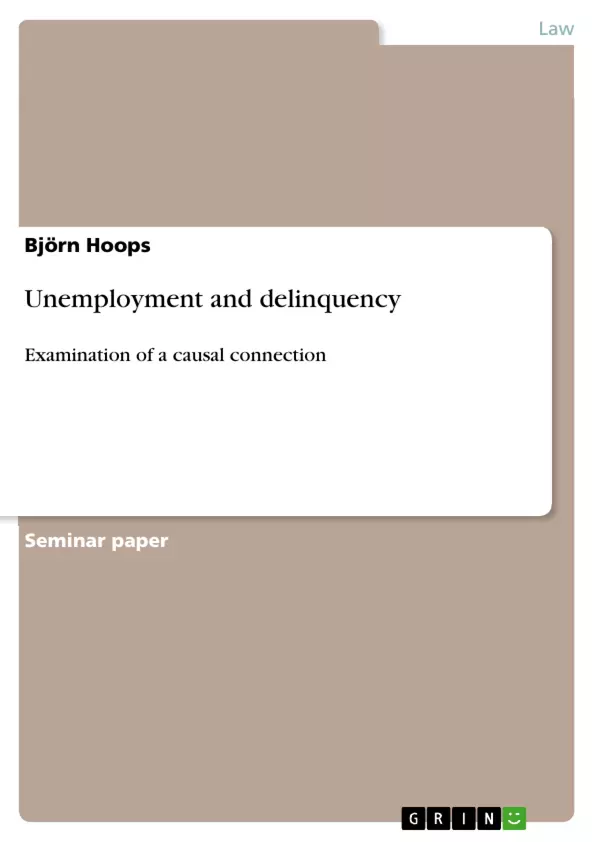It is a stereotype and a lot of people think it true: Unemployed people are more criminal than others. Based on empirical studies and criminological essays, this paper shall find out if this is actually true.
It shall be examined if there is a direct connection between unemployment and delinquency, focusing on the individuals and the question if unemployment causes them to commit a crime.
To become acquainted with the origins of delinquency and the situation of unemployed individuals, the work of Hirschi and the report of Krüger and Amelang, which contain essential information, have been of great importance.
To gather empirical evidence for a connection, criminal statistics and other empirical studies shall be examined at first. Afterwards, the consequences of unemployment and the causes of delinquency shall be described. Eventually it shall be determined if consequences and causes correspond to each other or induce one another. Referring to the results the conclusion will answer the question if there is a link.
Inhaltsverzeichnis (Table of Contents)
- Introduction
- Empirical studies
- Crime statistics
- Share in suspects
- Duration of unemployment
- Repeated delinquency
- Categories of crime
- Reliability of crime statistics
- Studies of the ifo institute
- Conclusion
- Crime statistics
- Consequences of Unemployment
- Social groups affected by unemployment
- Impact of unemployment
- Causes of delinquency
- Motivational theories
- Bond theories
- Links between unemployment and crime
- Anomy
- The importance of social networks
- Discussion
- Conclusion
Zielsetzung und Themenschwerpunkte (Objectives and Key Themes)
This paper aims to examine the relationship between unemployment and delinquency, specifically focusing on whether unemployment directly causes individuals to commit crimes. By analyzing empirical studies and criminological literature, the paper investigates the potential link between these two phenomena. Key themes and objectives of the paper include: * Examining the empirical data available on the relationship between unemployment and crime. * Discussing the consequences of unemployment for individuals and society. * Exploring the various theories that explain the causes of delinquency. * Analyzing the potential links between unemployment and crime, focusing on concepts like anomie and the importance of social networks.Zusammenfassung der Kapitel (Chapter Summaries)
The paper begins by presenting a detailed analysis of crime statistics from North Rhine-Westphalia in 2006. The data is examined to determine whether the percentage of unemployed individuals among suspects is higher than their share in the overall population. Furthermore, the paper analyzes the correlation between the duration of unemployment and the likelihood of becoming a suspect.
The next section delves into the consequences of unemployment, focusing on the social groups most affected and the impact of unemployment on individuals. This chapter provides a comprehensive overview of the broader societal ramifications of unemployment.
The following chapter examines the causes of delinquency, exploring both motivational and bond theories. The paper provides an overview of key criminological perspectives on the factors that contribute to criminal behavior.
The final section before the conclusion explores the potential links between unemployment and crime. The paper investigates the concept of anomie and the role of social networks in shaping individual behavior. This chapter discusses how unemployment can contribute to criminal activity through these mechanisms.
Schlüsselwörter (Keywords)
The key focus areas of this paper include the relationship between unemployment and delinquency, crime statistics, the consequences of unemployment, the causes of delinquency, anomie, social networks, and the theoretical perspectives on crime.Frequently Asked Questions
Is there a direct link between unemployment and crime?
Research shows a correlation in crime statistics, but a direct causal link is complex. It involves motivational factors and the weakening of social bonds rather than just a lack of income.
What does Hirschi's Bond Theory explain regarding delinquency?
Hirschi argues that individuals commit crimes when their bonds to society (attachment, commitment, involvement, belief) are weakened or broken. Unemployment can weaken these bonds.
How does "anomie" relate to unemployment and crime?
Anomie occurs when there is a gap between societal goals (like wealth) and the legitimate means to achieve them. Unemployed individuals may experience this strain and turn to crime as an alternative means.
What do crime statistics say about unemployed suspects?
Statistics often show a higher percentage of unemployed individuals among suspects compared to the general population, but this data must be interpreted carefully regarding social labeling and police focus.
Does the duration of unemployment affect criminal behavior?
Long-term unemployment can lead to social isolation and a loss of structured daily life, which empirical studies suggest may increase the likelihood of repeated delinquency.
- Arbeit zitieren
- Björn Hoops (Autor:in), 2009, Unemployment and delinquency, München, GRIN Verlag, https://www.grin.com/document/137604



